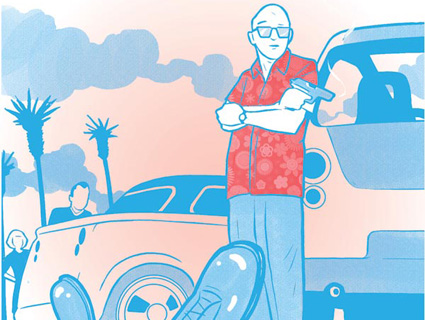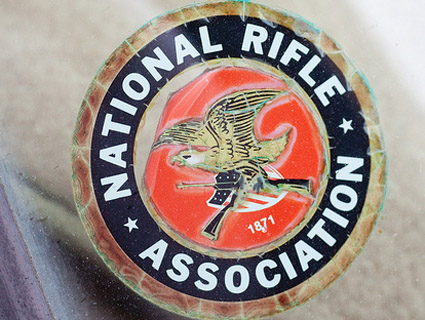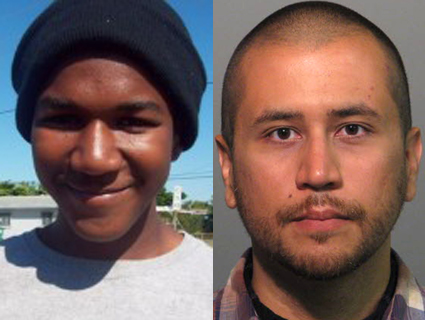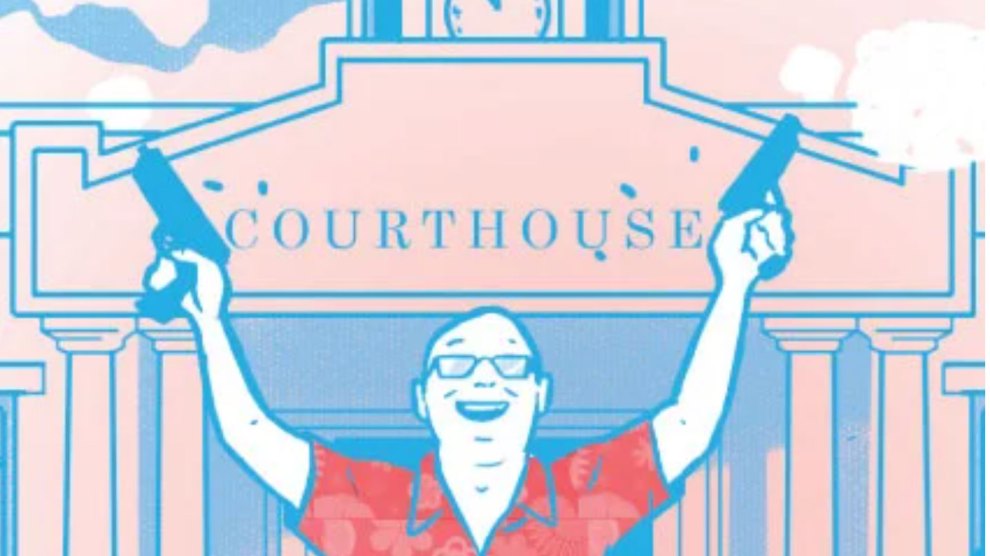
The Florida law made infamous this spring by the killing of unarmed teenager Trayvon Martin was conceived during the epic hurricane season of 2004. That November, 77-year-old James Workman moved his family into an RV outside Pensacola after Hurricane Ivan peeled back the roof of their house. One night a stranger tried to force his way into the trailer, and Workman killed him with two shots from a .38 revolver. The stranger turned out to be a disoriented temporary worker for the Federal Emergency Management Agency who was checking for looters and distressed homeowners. Workman was never arrested, but three months went by before authorities cleared him of wrongdoing.
That was three months too long for Dennis Baxley, a veteran Republican representative in Florida’s state Legislature. Four hurricanes had hit the state that year, and there was fear about widespread looting (though little took place). In Baxley’s view, Floridians who defended themselves or their property with lethal force shouldn’t have had to worry about legal repercussions. Baxley, a National Rifle Association (NRA) member and owner of a prosperous funeral business, teamed up with then-GOP state Sen. Durell Peaden to propose what would become known as Stand Your Ground, the self-defense doctrine essentially permitting anyone feeling threatened in a confrontation to shoot their way out.
Or at least that’s the popular version of how the law was born. In fact, its genesis traces back to powerful NRA lobbyists and the American Legislative Exchange Council (ALEC), a right-wing policy group. And the law’s rapid spread—it now exists in various forms in 25 states—reflects the success of a coordinated strategy, cultivated in Florida, to roll back gun control laws everywhere.
Baxley says he and Peaden lifted the law’s language from a proposal crafted by Marion Hammer, a former NRA president and founder of the Unified Sportsmen of Florida, a local NRA affiliate. A 73-year-old dynamo who tops off her 4-foot-11 frame with a brown pageboy, Hammer has been a force in the state capital for more than three decades. “There is no more tenacious presence in Tallahassee,” Gov. Jeb Bush’s former chief of staff told CNN in April. “You want her on your side in a fight.”
Ever since neighborhood watch volunteer George Zimmerman shot Trayvon Martin point-blank in the chest, the term Stand Your Ground has been widely discussed, but what does it really mean? A Mother Jones review of dozens of state laws shows that the concept is built on three planks from the pioneering Florida legislation: A person claiming self-defense is not required to retreat from a threat before opening fire; the burden is almost always on prosecutors to prove that a self-defense claim is not credible; and finally, the shooter has immunity from civil suits relating to the use of deadly force. While the so-called Castle Doctrine (as in “a man’s home is his”) has for centuries generally immunized people from homicide convictions if they resorted to deadly force while defending their home, Florida’s law was the first to extend such protection to those firing weapons in public spaces—parking lots, parks, city streets.
Stand Your Ground was shepherded through the Legislature with help from then-state Rep. Marco Rubio and signed into law by Bush on April 26, 2005. It was the “first step of a multi-state strategy,” Wayne LaPierre, a long-standing NRA official who is now the group’s CEO, told the Washington Post. “There’s a big tailwind we have, moving from state legislature to state legislature. The South, the Midwest, everything they call ‘flyover land.'” The measure was adopted as model legislation by ALEC, a corporate-sponsored national consortium of lawmakers—which is how it ended up passing in states from Mississippi to Wisconsin. “We are not a rogue state,” says Baxley, who was bestowed with the NRA’s Defender of Freedom Award shortly before his bill passed. “But we may be a leader.”
Supporters of such laws cite the slippery-slope argument: Seemingly reasonable regulations—waiting periods, licenses, limits on assault weapons and high-capacity magazines—inevitably lead to ever-stricter measures, they argue, until citizens’ constitutional right to defend themselves against government tyranny has vanished. Hammer suggests that an assault on gun rights motivated her move to Tallahassee from her native South Carolina in 1974: “Florida was seeing what I would call a burst of gun control measures being filed by Northerners who had moved to South Florida,” she told a radio interviewer in 2005. “There was so much gun control being filed that it was very difficult for the NRA to deal with it from over 1,000 miles away.”
After leaving work late one night in the mid-1980s, Hammer claims, a group of men in a car threatened her, only to be scared off when she pulled a gun on them. No police report was ever filed, but Hammer maintains that shortly after this incident a local police chief told her that she could have been arrested had she shot them. It was a convenient tale. She soon became a driving force behind Florida’s “shall issue” legislation, passed in 1987, which stripped authorities of the ability to deny a concealed-weapons permit to someone they consider potentially dangerous.
The shall-issue law would allow thousands of ex-convicts and spouse beaters to pack heat; a Florida state attorney called it “one of the dumbest laws I have ever seen.” A 1988 investigation by the St. Petersburg Times found permits had been given to two fugitives with outstanding arrest warrants, a disgraced cop who’d been convicted of a DUI and turned down for a county gun license, a man charged with fondling an eight-year-old girl, and a dead man. Florida has since issued more than 2 million concealed-weapons permits.
That same year Hammer called a panel of Florida legislators “a modern-day Gestapo” for considering legislation to keep guns away from violent criminals and the mentally ill. (“This is the lowest standard of integrity I have ever seen for a lobbyist in Tallahassee,” one pro-gun Republican responded at the time.)
But Hammer’s efforts really picked up steam when she served as the NRA’s first female president from 1995 to 1998—by the end of which time Bush had been elected governor and the GOP had taken firm control of the Statehouse. Hammer and her allies have since barred city and county governments from banning guns in public buildings; forced businesses to let employees keep guns in cars parked in company lots; made it illegal for doctors to warn patients about the hazards of gun ownership (this controversial “Docs versus Glocks” law was overturned by a George W. Bush-appointed federal judge); and secured an exemption to Florida’s celebrated open-records laws in order to keep gun permit holders’ names a secret. (Baxley had cosponsored a similar bill, explaining in its original text that such lists had been used “to confiscate firearms and render the disarmed population helpless in the face of Nazi atrocities” and Fidel Castro’s “tyranny.”)
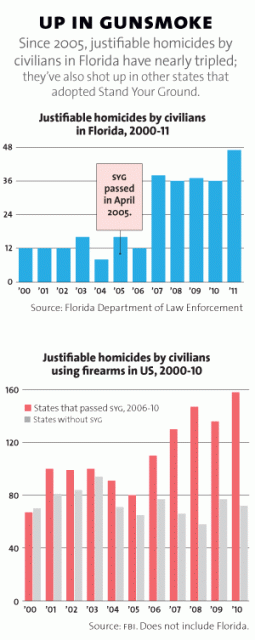 As Florida became known to some as the “Gunshine State,” it began exporting its laws, with ALEC’s help, to other statehouses. This effort was no doubt aided by the fact that the vice president of Hammer’s Unified Sportsmen of Florida is John Patronis, cousin to Republican state Rep. Jimmy Patronis—sponsor of the aforementioned bill that kept names of concealed-weapons license holders secret and ALEC’s current Florida chairman. The organization would also be instrumental to spreading Stand Your Ground nationwide. “We definitely brought that bill forward to ALEC,” said Baxley, a member of the group. “It’s a place where you can share ideas. I don’t see anything nefarious about sharing good ideas.” The NRA has served as “corporate co-chair” of ALEC’s Public Safety and Elections task force, which pushed Stand Your Ground and other gun laws. Since 2005, the year Florida’s law was passed, gun manufacturers like Beretta, Remington, and Glock have poured as much as $39 million into the NRA’s lobbying coffers.
As Florida became known to some as the “Gunshine State,” it began exporting its laws, with ALEC’s help, to other statehouses. This effort was no doubt aided by the fact that the vice president of Hammer’s Unified Sportsmen of Florida is John Patronis, cousin to Republican state Rep. Jimmy Patronis—sponsor of the aforementioned bill that kept names of concealed-weapons license holders secret and ALEC’s current Florida chairman. The organization would also be instrumental to spreading Stand Your Ground nationwide. “We definitely brought that bill forward to ALEC,” said Baxley, a member of the group. “It’s a place where you can share ideas. I don’t see anything nefarious about sharing good ideas.” The NRA has served as “corporate co-chair” of ALEC’s Public Safety and Elections task force, which pushed Stand Your Ground and other gun laws. Since 2005, the year Florida’s law was passed, gun manufacturers like Beretta, Remington, and Glock have poured as much as $39 million into the NRA’s lobbying coffers.
Baxley defends the NRA’s involvement: “They have lots of members who want this statute. They’re people who live in my district. They’re concerned about turning back this lawless chaos and anarchy in our society.” Records show that the NRA’s Political Victory Fund has long supported Baxley—from a $500 contribution in 2000 (the state’s maximum allowable donation) to $35,000 spent on radio ads in support of his state Senate bid in 2007. Peaden received at least $2,500 from the NRA and allied groups over the years. The NRA also maxed out on direct contributions to Jeb Bush’s gubernatorial campaigns in 1998 and 2002, and it gave $125,000 to the Florida GOP between 2004 and 2010—more than it gave to any other state party. According to the Center for Media and Democracy, the NRA spent $729,863 to influence Florida politics in the 2010 election cycle alone.
Once fairly open to speaking with the media, Hammer has proved elusive since the Trayvon Martin killing. When I approached her for this story, explaining that I was a third-generation gun collector with a Florida carry permit, she declined to comment on the record. “Unfortunately,” she wrote in an email, “if you did a truly honest article on the law, it would either never be printed in Mother Jones, or if they did publish it, it would not be believed by the mag’s audience!”
A climate of fear helped spread Stand Your Ground, according to the National District Attorneys Association. In 2007, it conducted the first in-depth study on the expansion of the Castle Doctrine and found that it took root in part because “there was a change in perceptions of public safety after the terrorist attacks of 9/11. Many citizens…became concerned that government agencies could not protect every citizen in the event of subsequent terror attacks.” Indeed, the NRA used 9/11 to promote its legislative agenda, most notably in its unsuccessful push to let all commercial airline pilots pack heat. “What would have made 9/11 impossible?” LaPierre asked a crowd at the 2002 NRA convention in Reno, Nevada. “If those pilots on those four airplanes had the right to be armed.”
Steven Jansen, vice president and CEO of the Association of Prosecuting Attorneys and a former prosecutor in Detroit, was one of the study’s authors. He first noticed the Stand Your Ground movement in early 2006 when it spread from Florida to Michigan, sponsored there by Republican state Sen. Rick Jones, an ALEC member. The law was “troublesome to me,” Jansen told me. “We didn’t really see a public safety need for it, and it could only muddy the legal waters.”
With a confrontation like the one between Trayvon Martin and George Zimmerman, cops and prosecutors would now be forced to make judgment calls about which participant felt like he was in more peril. That raised serious questions about whether real-world situations would ever be as clear-cut as the lawmakers assumed. Jansen pointed to scenarios ranging from road rage to scuffles between rival fraternities: “To presume from the outset, as Florida’s law arguably does, that a deadly response in these situations is justified would be at best irresponsible; at worst, that assumption could create a new protected set of behaviors that might otherwise be considered hate crimes or vigilantism.”
But legislators across the country nevertheless ignored objections from law enforcement. Indeed, Stand Your Ground gives armed civilians rights that even cops don’t enjoy: “Society hesitates to grant blanket immunity to police officers, who are well-trained in the use of deadly force and require yearly testing of their qualifications to carry a firearm,” Jansen has written. “Yet the expansion of the Castle Doctrine has given such immunity to citizens.”
Back when Florida passed Stand Your Ground, a few legislators did raise concerns. “This could be two gangs, deciding to have a fight in the street in Miami,” said then-Rep. Jack Seiler, a Democrat from South Florida. “They both have a right to be standing on Biscayne Boulevard.” It was a prescient warning. In 2006, a Miami man avoided prosecution after spraying a car filled with gang members with 14 bullets. In 2008, a 15-year-old Tallahassee boy was killed in a shoot-out between rival gangs; two of the gang members successfully took refuge behind Stand Your Ground.
The cumulative effect of those cases has been staggering: Two years after Stand Your Ground passed in Florida, the number of “justifiable homicides” by civilians more than doubled, and it nearly tripled by 2011. FBI statistics show a similar national trend: Justifiable homicides doubled in states with Florida-style laws, while they remained flat or fell in states that lacked them. (Update, 6/11/12: A new study from Texas A&M University shows that SYG laws result in no crime deterrence—while adding 500 to 700 homicides per year nationally across the 25 states with the laws.) Jansen also notes that research has shown that, when it came to domestic-abuse cases, “the only thing Stand Your Ground did was blur the lines between who was the batterer and who was the victim.”
He says the laws have been passed without legislators asking basic questions: What, exactly, makes a fear of imminent harm reasonable? Do the laws have a disparate negative effect on minorities or juveniles? And, perhaps the simplest question: “Is it worth losing a life over a car radio?”
That’s happened, too. In Miami, a man was granted immunity in March for chasing down a burglar and stabbing him after the thief swung a bag of stolen car radios at him. He “was well within his rights to pursue the victim and demand the return of his property,” the judge ruled. A state attorney for Miami-Dade County disagreed: “She, in effect, is saying that it’s appropriate to chase someone down with a knife to get property back.”
For now, Florida has deemed that it is indeed appropriate, and polls taken after the Martin killing show that half of voters agree. But outrage over that case (as well as ALEC’s push for voter ID laws; see page 30) has cost ALEC prime corporate sponsors—including McDonald’s, Coca-Cola, Pepsi, Kraft, and Procter & Gamble—and its tax-exempt status has been challenged by Common Cause. In April, ALEC disbanded the panel that pushed Stand Your Ground and redirected funds to “task forces that focus on the economy.”
But Hammer and her allies are still pressing for laxer gun laws. This spring, Hammer got Florida to drop the cost of gun permits and lower the age restriction to 17 for military members, and she’s still fighting to allow residents to carry their guns openly. And the NRA is pumping millions into the November elections nationally. “America needs us now more than ever as we gather together as one in the most dangerous times in American history,” LaPierre told the NRA’s annual convention in St. Louis in April. “By the time I finish this speech, two Americans will be slain, six women will be raped, 27 of us will be robbed, and 50 more will be beaten. That is the harsh reality we face every day.” With an unabashed reference to the shooting that brought Stand Your Ground to national attention, LaPierre drove home his point. “But the media, they don’t care. Everyday victims aren’t celebrities. They don’t draw ratings and sponsors, but sensational reporting from Florida does.”
Safety Off
Since 2005, Florida lawmakers have taken aim at gun control with a barrage of deregulation measures:
- Requiring employers to let employees keep guns in their cars while at work
- Requiring city and county governments to allow guns in public buildings and parks
- Lifting a long-standing ban on guns in national forests and state parks
- Allowing military personnel as young as 17 to get concealed-weapons licenses. (Age limit remains 21 for everyone else.)
- Withholding the names of concealed-carry licensees in public records
- Permitting concealed-carry licensees “to briefly and openly display the firearm to the ordinary sight of another person.” (The original bill would have allowed guns on college campuses, but it was amended after a GOP lawmaker’s friend’s daughter was accidentally killed with an AK-47 at a frat party.)
- Prohibiting doctors from asking patients if they keep guns or ammo in the house unless it’s “relevant” to their care or safety. (Overturned by a federal judge.)
- Allowing legislators, school board members, and county commissioners to carry concealed weapons at official meetings. (Didn’t pass; another bill to let judges pack heat “at any time and in any place” died in 2009.)
- Designating a day for tax-free gun purchases. (Didn’t pass.)
- Exempting guns manufactured in Florida from any federal regulations. (Didn’t pass.)
For more, take a closer look at the money trail behind Florida’s Stand Your Ground law, read about how the NRA pushed for the right to pack heat anywhere, and explore our comprehensive explainer on the Trayvon Martin killing. Also be sure to check out the Tampa Bay Times’ eye-opening investigation of nearly 200 Stand Your Ground cases in Florida.

